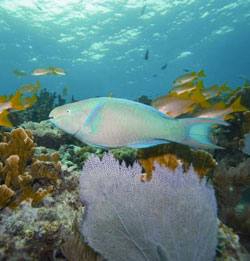Marine reserves can help damaged coral reefs recover
Marine reserves can help damaged coral reefs recover
mongabay.com
May 14, 2007
Marine reserves can help coral reefs damaged by overfishing, disease, and bleaching caused by high temperatures, reports a new study published in Proceedings of the National Academy of Sciences.
Monitoring corals of the Bahamas’ Exuma Cays Land and Sea Park, a international team of researchers “found that the number of young corals doubled in areas in which native fish, such as parrotfish, were protected from being caught,” according to a news release from the University of Exeter.
The researchers say that parrotfish help control the growth of seaweeds that would otherwise choke out young corals. Young corals are important to reef eclogy becuase they replace corals that have died as the result of disease, high temperatures, and storm damage.

Adult male of the queen parrotfish, Scarus vetula, one of the most important grazers on Caribbean coral reefs. Photograph courtesy of Evan D’Alessandro. |
“This is the first evidence we have that marine reserves benefit coral,” said Dr. Peter Mumby, lead author and a professor at the University of Exeter. “We estimate that humans have already destroyed around 30% of the world’s coral reefs and climate change is now causing further damage to coral. These findings illustrate the need to maintain high levels of parrotfishes on reefs in order to give corals a fighting chance of recovering. This can either be done using marine reserves or national fisheries legislation that protects parrotfish.”
The researchers say that about 19 percent of the world;s coral reefs are found in marine reserves.
Related articles
 |
Some corals may survive acidification caused by rising CO2 levels
(3/29/2007) Several studies have shown that increased atmospheric carbon dioxide levels are acidifying the world's oceans. This is significant for coral reefs because acidification strips carbonate ions from seawater, making it more difficult for corals to build the calcium carbonate skeletons that serve as their structural basis. Research has shown that many species of coral, as well as other marine microorganisms, fare quite poorly under the increasingly acidic conditions forecast by some models. However, the news may not be bad for all types of corals. A study published in the March 30 issue of the journal Science, suggests that some corals may weather acidification better than others.
Marine protected areas boost fishing yields
(12/18/2006) A new study conducted on the reefs of Madagascar found that marine protected areas can benefit the fishing industry. The study, authored by Frances Humber, a scientist with conservation group Blue Ventures, found that implementing seasonal fishing closures for octopus boosted returns for fishermen when the closed areas were reopened to fishing after seven months. Octopus yields increased 13 times while the total weight of octopus caught jumped 25 times.
Coral reefs can be saved from global warming
(11/3/2006) The outlook for coral reefs — often termed the rainforests of the sea — is dire. Overfishing, pollution, damage from anchors, mining for construction materials, and over-collection for the pet trade are all over-shadowed by climate change which could decimate reefs by higher water temperatures and increasingly acidic conditions which could render many coral species incapable of forming carbonate support structures. Nevertheless a new report from the World Conservation Union (IUCN) and The Nature Conservancy says that measures can be taken to help increase the survival chances for coral reefs. The report, "Coral Reef Resilience and Resistance to Bleaching", outlines strategies for helping reefs to be better adapt to the impacts of climate change.
Coral reef parks established by locals more effective than government reserves
(7/31/2006) Coral reef marine protected areas established by local people for traditional use can be far more effective at protecting fish and wildlife than reserves set up by governments expressly for conservation purposes, according to a study by the New York-based Wildlife Conservation Society (WCS) and other groups.
This article is based on a news release from the University of Exeter.














